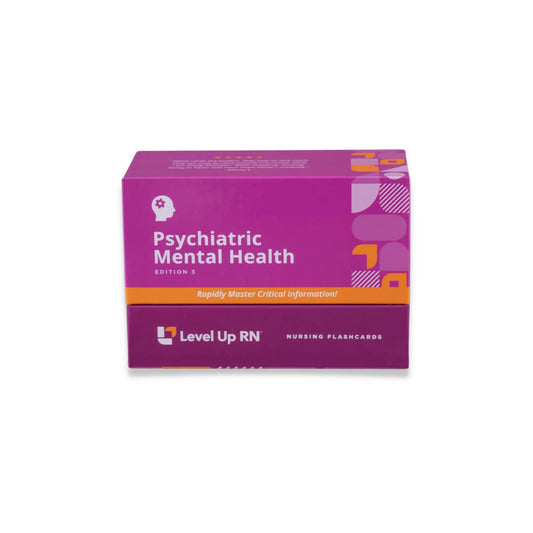In this article, we'll cover the stress, the stages of general adaptation syndrome, and how to recognize and care for different levels of anxiety. Why does stress make you tired? How can a little bit of anxiety help you perform better on the NCLEX? We'll answer these questions and more!
This series follows along with our Psychiatric Mental Health Nursing Flashcards which are intended to help RN and PN nursing students study for nursing school exams, including the ATI, HESI, and NCLEX.
Psychiatric Mental Health - Nursing Flashcards
Stress
Stress is the body’s physical and emotional reaction to physical, mental, or emotional pressure. One framework used to describe how the body reacts to stress is called general adaptation syndrome.
General adaptation syndrome
General adaptation syndrome is a framework for understanding the body's response to a stressor, and it contains three stages: alarm reaction, resistance, and exhaustion.
Alarm reaction stage
The first stage of general adaptation syndrome is the alarm reaction stage, during which the body has a fight-or-flight response to a stressor.
The fight or flight response is the way our bodies react to danger, whether real or imagined, and the body prepares to release hormones like adrenaline and cortisol, and modifies organ function to best serve you to take flight (run away) from danger, or to fight.
Signs and symptoms of the alarm reaction stage
During the alarm reaction stage, cortisol levels will increase as well as heart rate and blood pressure.
All of these bodily reactions prepare you to handle danger.
Cardiac output increases to flow blood to your muscles to prepare you to fight and increase your strength.
Blood pressure increases due to vasoconstriction, directing blood away from the gastrointestinal system (running away from danger is not a safe time to poop), and this vasoconstriction also makes you less likely to bleed out if you were to be injured.
Bronchodilation facilitates breathing to prepare you to run.
Pupil dilation occurs to allow you to see farther distances and secure yourself from threats.
Need to learn more about the sympathetic nervous system and our fight or flight response? Check out our Medical-Surgical Nursing Flashcards.
Resistance stage
After the alarm reaction stage, the body enters the resistance stage. After the initial shock of the stressor subsides, the body attempts to normalize its vital signs and its hormone levels.
Signs and symptoms of the resistance stage
Signs and symptoms of the resistance stage can include poor concentration, irritability, and frustration. If you have ever had a noticeable stressor and felt frustrated or irritable later in the day, this is a normal part of the body's response to stress.
Exhaustion stage
If the stress continues beyond the resistance stage, the body enters the exhaustion stage. During the exhaustion stage, the prolonged stress depletes the body's resources and weakens the immune symptoms.
The alarm reaction stage uses a lot of energy and the resistance stage is working hard to bring you to homeostasis, which is why prolonged periods of this are depleting to the body.
Signs and symptoms of the exhaustion stage
Symptoms associated with the exhaustion stage include fatigue, depression, and anxiety. Disease is another sign of the exhaustion stage, because the immune system is not functioning at full capacity.
Anxiety
Anxiety is an emotion characterized by feelings of uneasiness, worry, tension, or nervousness. We will describe four levels of anxiety, which include mild, moderate, severe, and panic-level anxiety, the characteristics and the symptoms of each level, and the nursing care of patients who have anxiety.
Mild anxiety
Mild anxiety is a normal, expected response to daily events in life. Mild anxiety heightens awareness, increases the perceptual field, allows for optimal functioning, and is also beneficial for learning.
So if you feel mild anxiety about taking the NCLEX, that's normal, expected, and might actually help you. Great news!
Need more NCLEX help? Check out the NCLEX Pack - Nursing Flashcards. This comprehensive flashcard bundle will help you prepare for your nursing school classes and exams, and focuses on just the information you need to level up!
Mild anxiety symptoms
Signs and symptoms of mild anxiety can include restlessness and irritability. It also increases an individual's motivation.
Moderate anxiety
Moderate anxiety causes decreased concentration, decreases the attention span and the perceptual field. Moderate anxiety may hinder problem-solving at this point.
Moderate anxiety symptoms
Signs and symptoms of moderate anxiety include increased heart rate and respiration rate, GI discomfort, and increased muscle tension.
Moderate anxiety nursing care
If you have a patient with mild-to-moderate anxiety, you can help your patient with problem-solving. Evaluate with your patient what coping mechanisms they have successfully used in the past. It's possible they can use those coping mechanisms again for the current situation.
Severe anxiety
If the body reaches severe anxiety, the perceptual field greatly decreases. Patients who have severe anxiety will have difficulty completing even a simple task, and effective learning is not possible at all at this level of anxiety.
Severe anxiety symptoms
Symptoms of severe anxiety can include a feeling of dread, headache, nausea, diarrhea, insomnia, palpitations, and hyperventilation.
Panic-level anxiety
Panic-level anxiety can cause a loss of contact with reality, and functioning and communication are really ineffective. Learning is not possible at all at this level of anxiety, and it can be life-threatening.
Panic-level anxiety symptoms
Panic level anxiety can include a feeling of terror or impending doom, hallucinations or delusions, dilated pupils, severe trembling, or diaphoresis (sweating). This is a very dangerous level of anxiety.
Panic-level anxiety nursing care
If your patient has severe or panic-level anxiety, problem-solving is not an option. It won't be effective.
Move your patient to a quiet setting, remain with them, use simple, clear language and speak slowly. Provide for the patient's physical needs, like food, rest, and safety.


